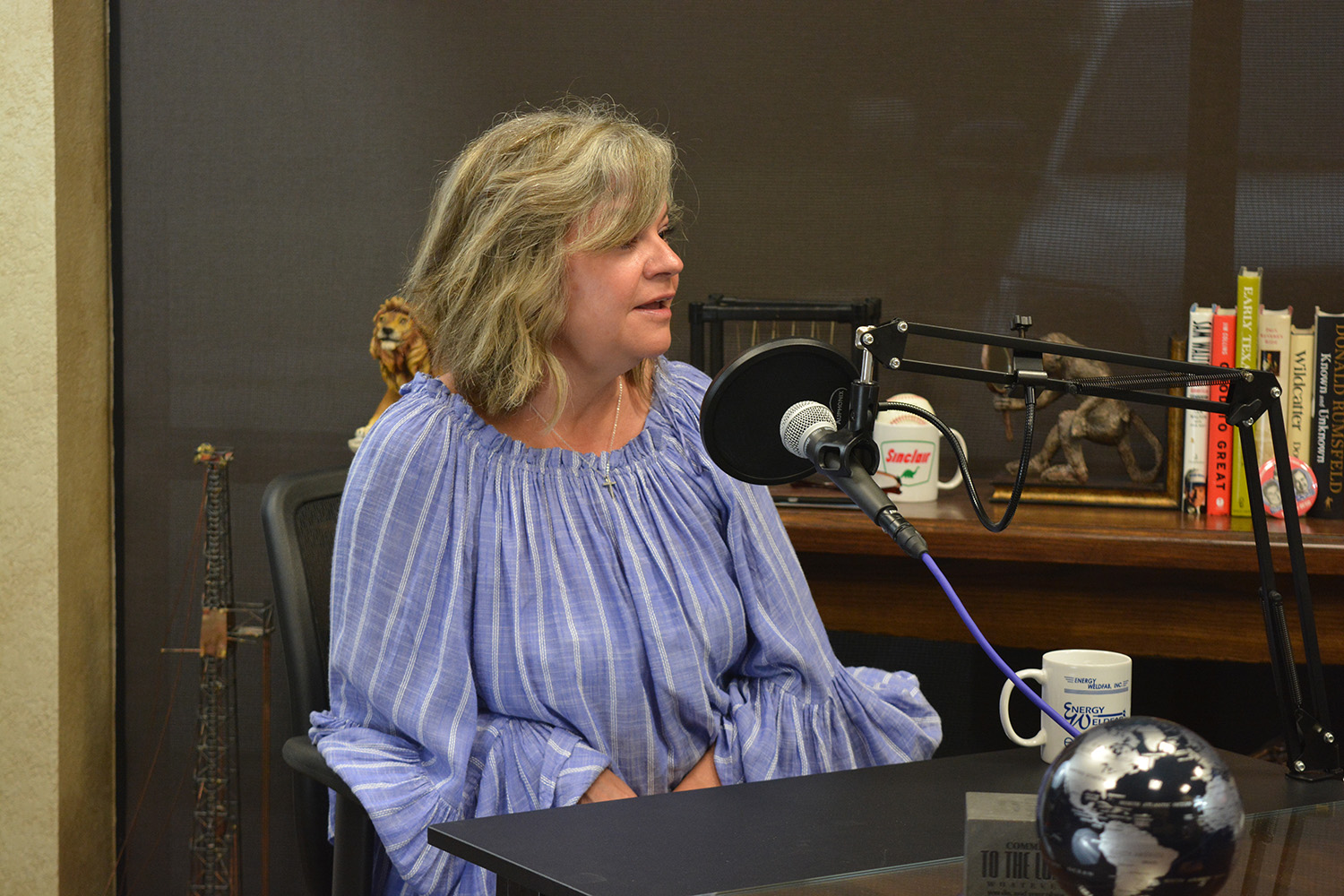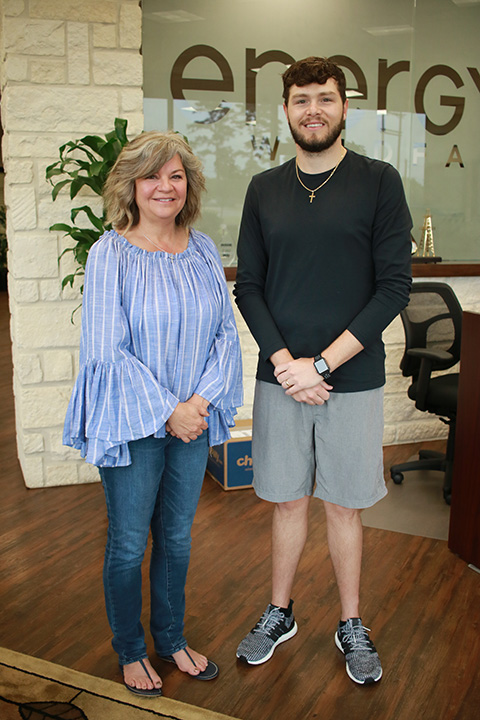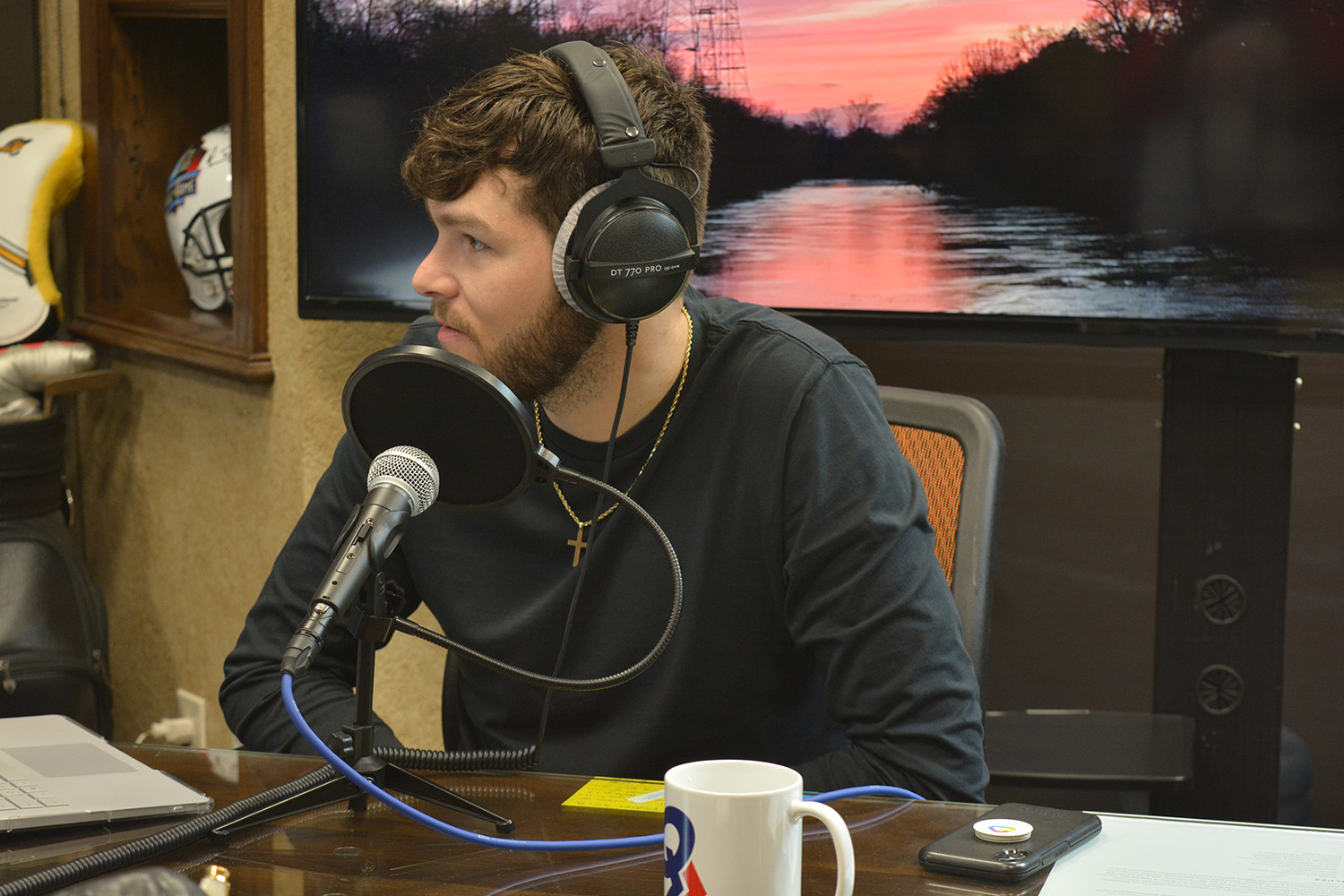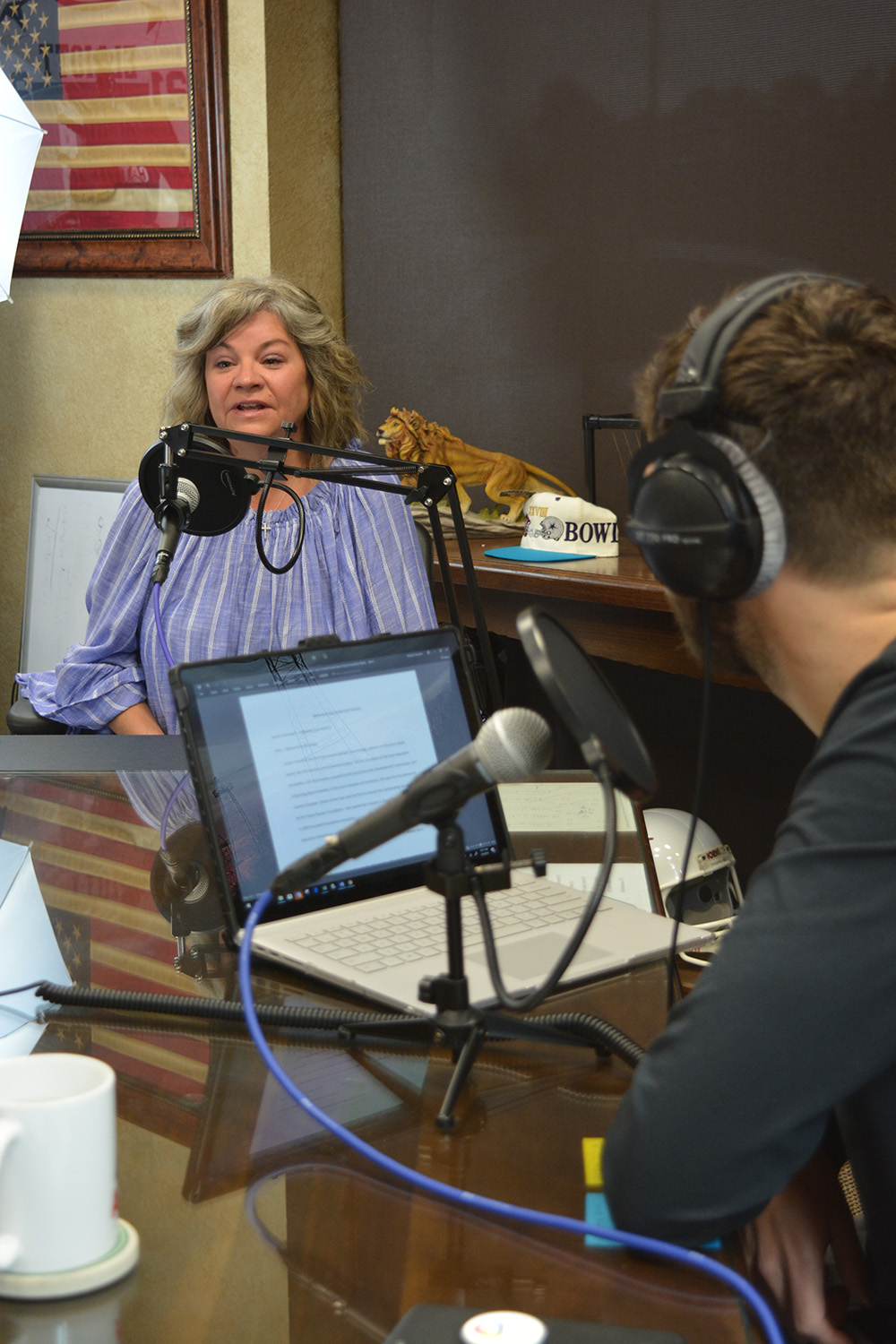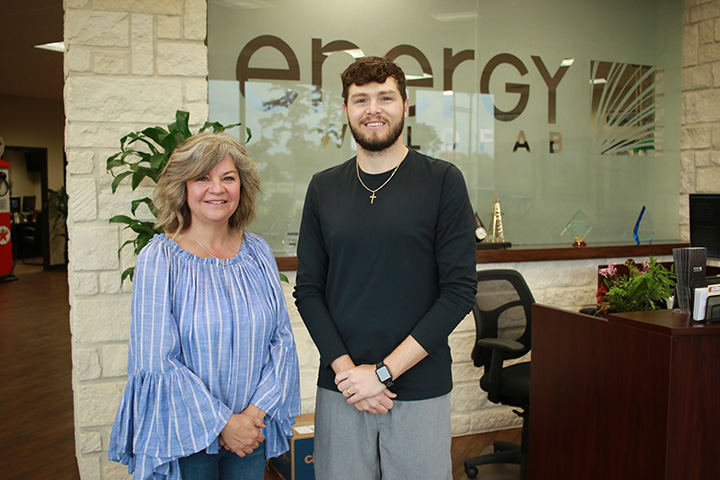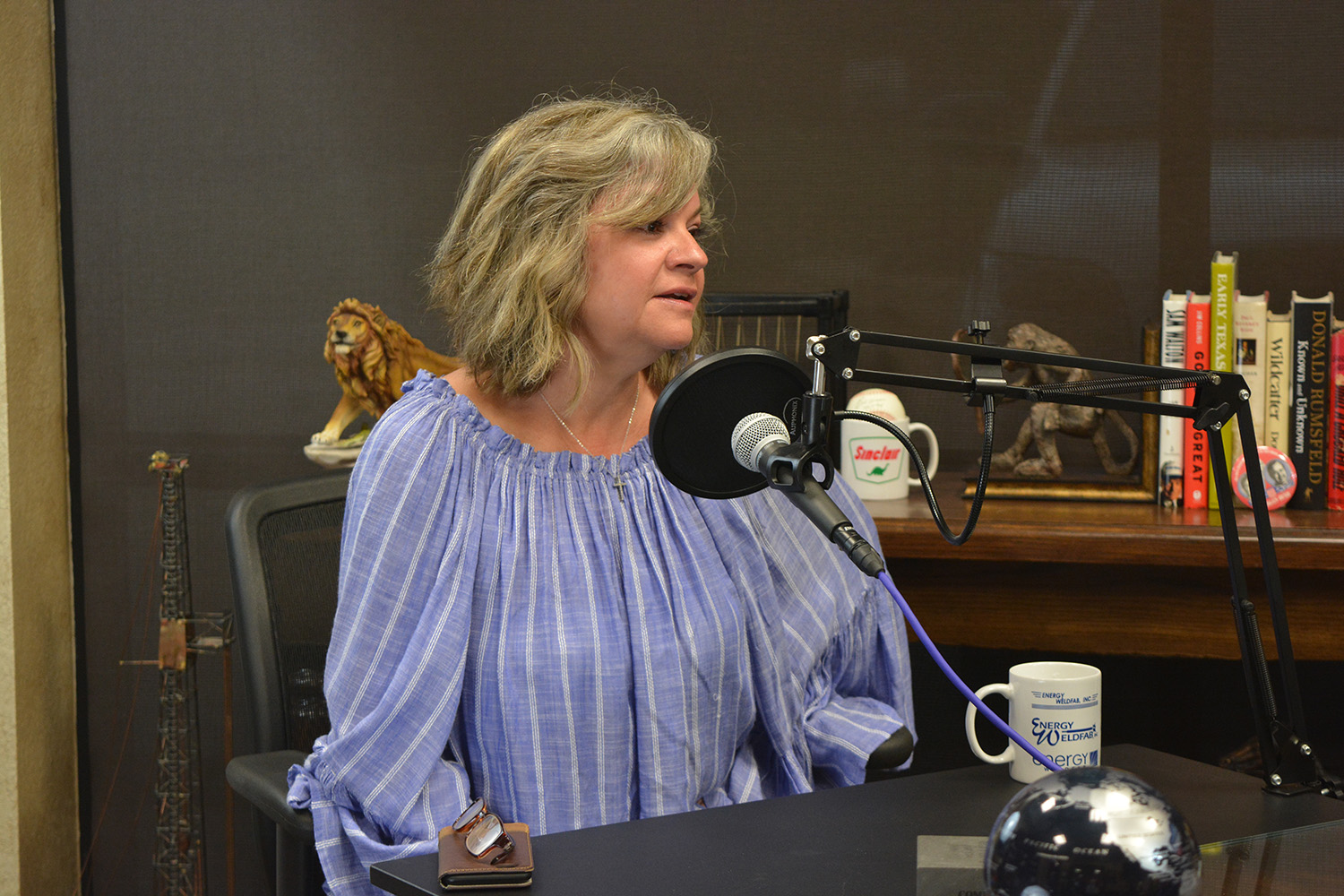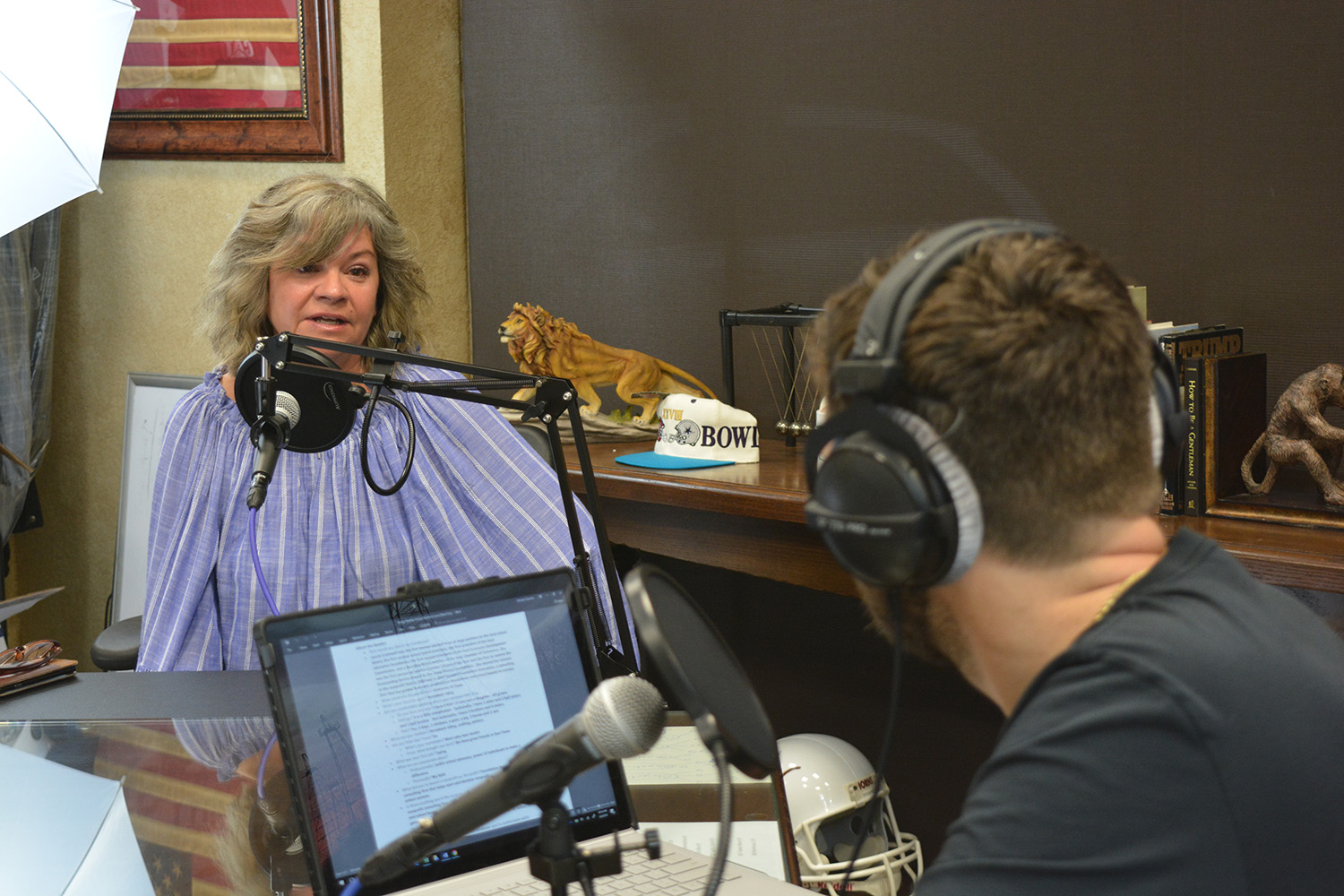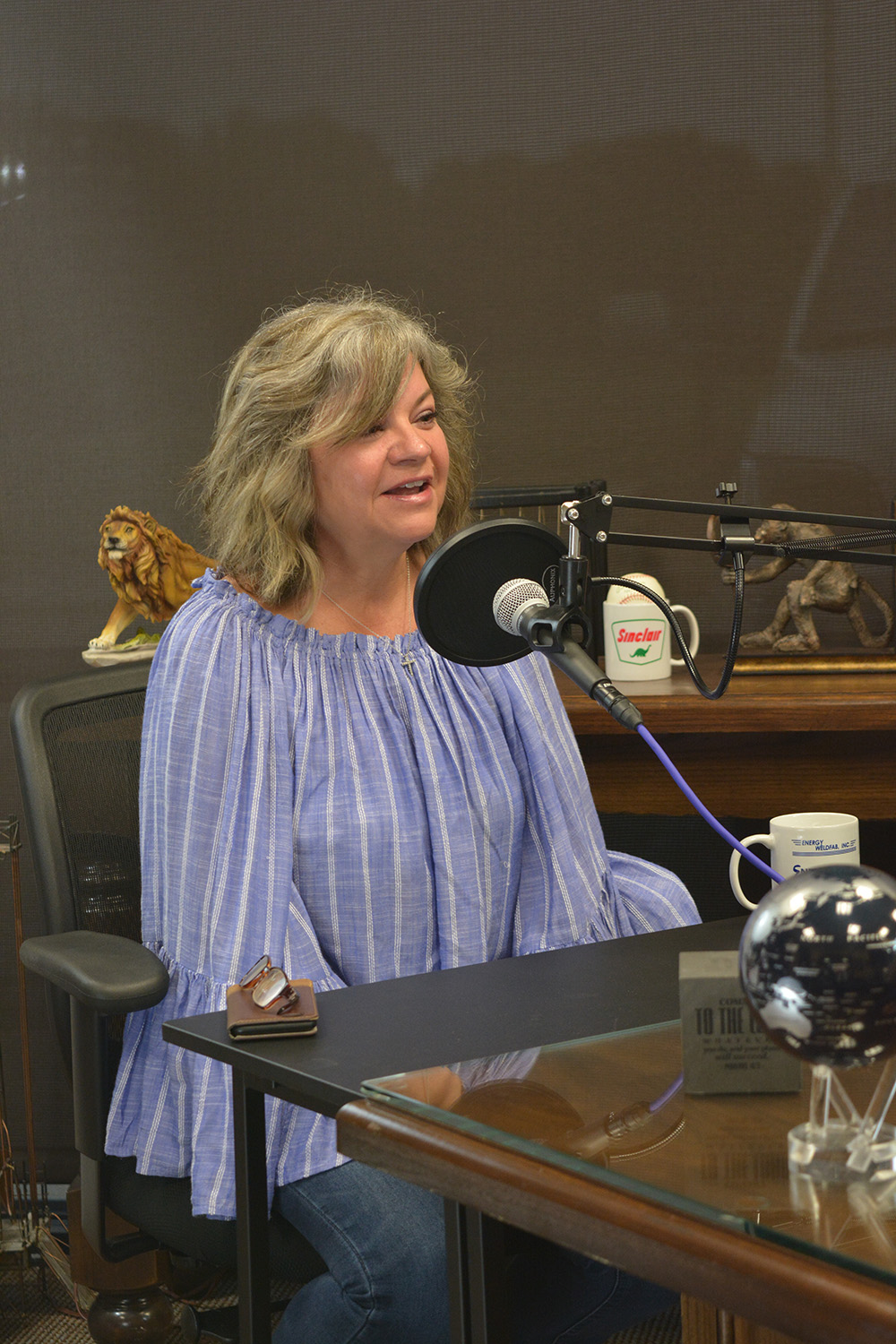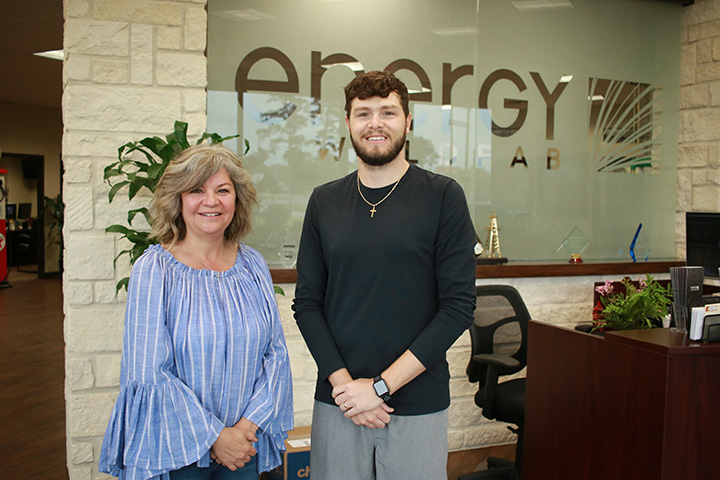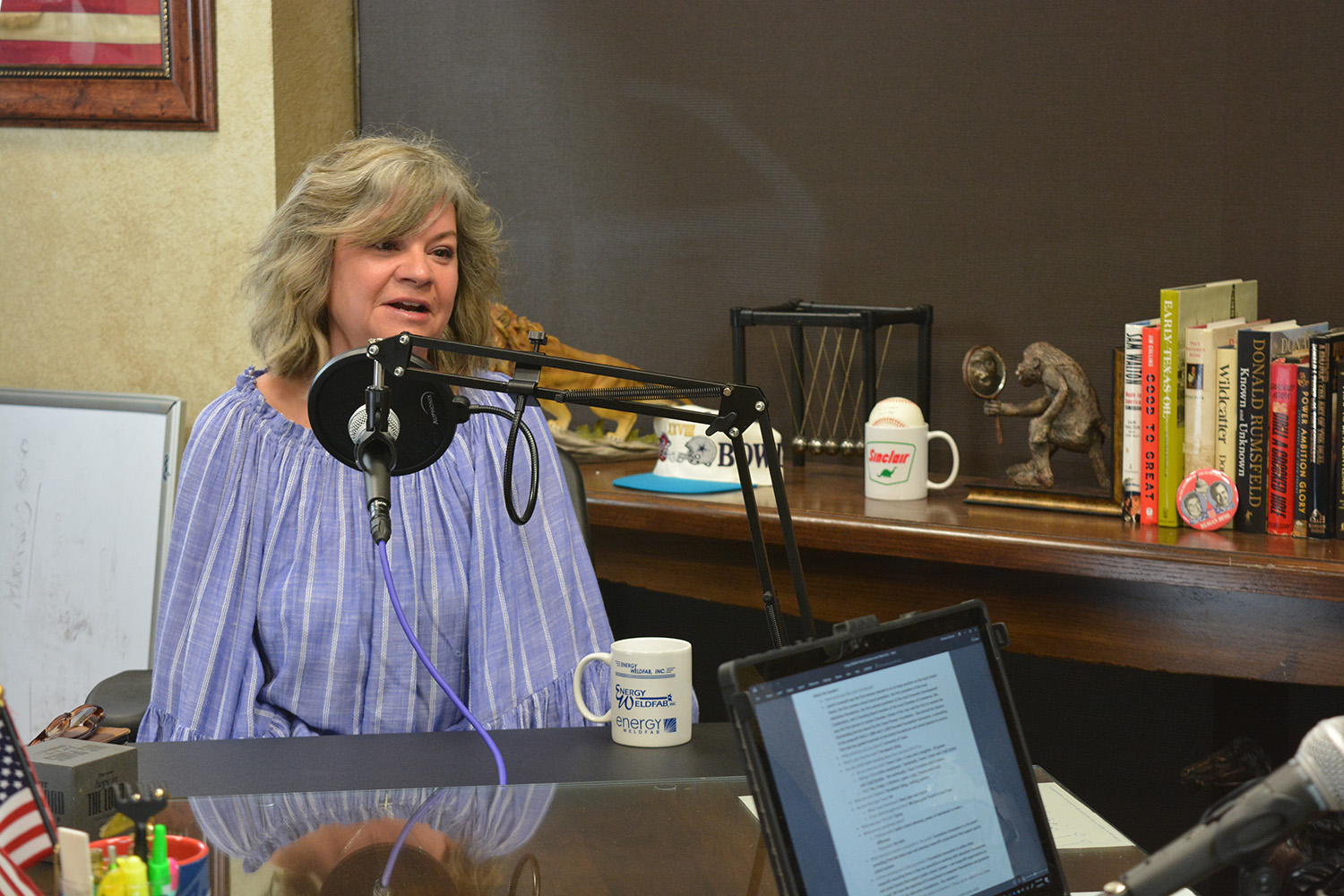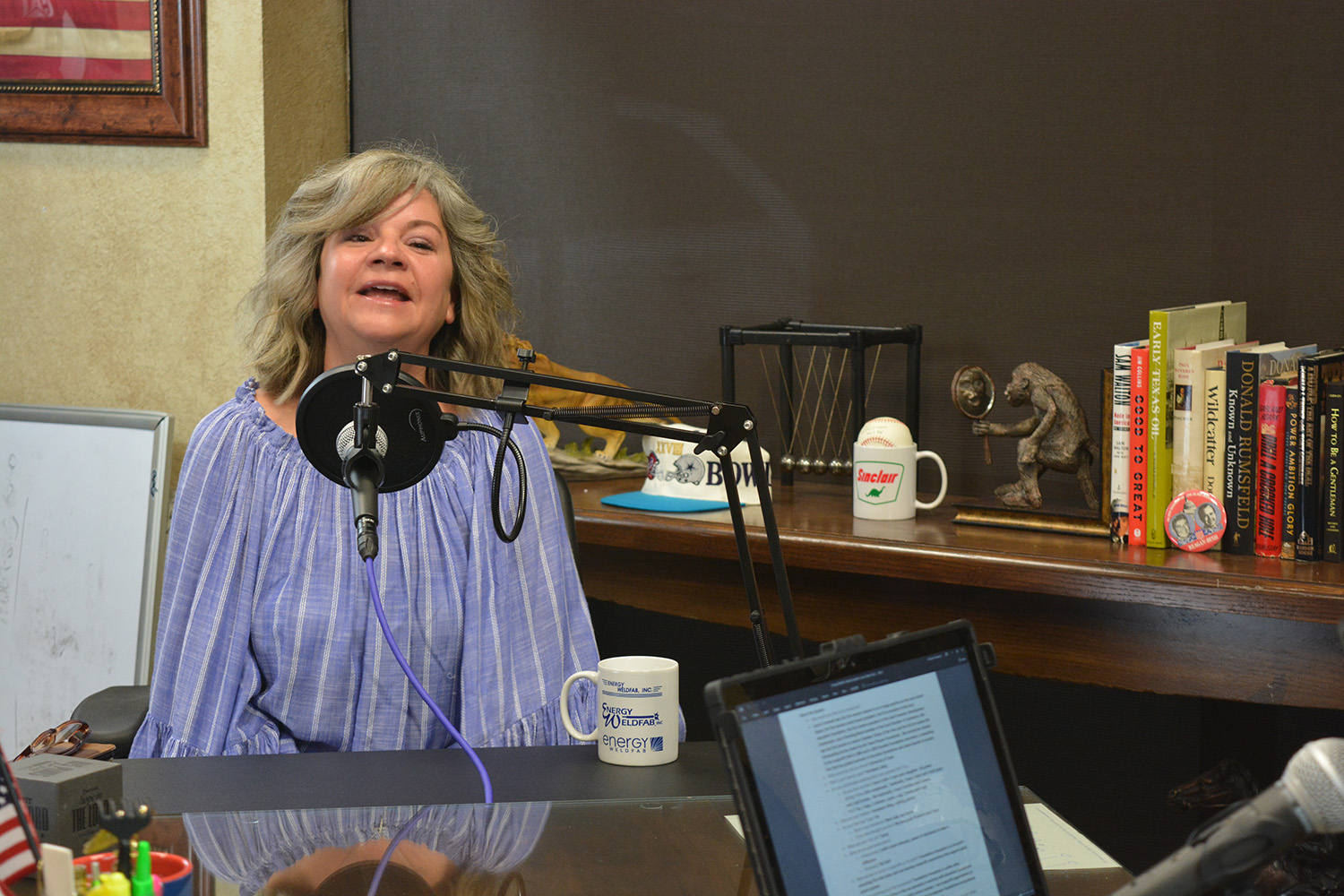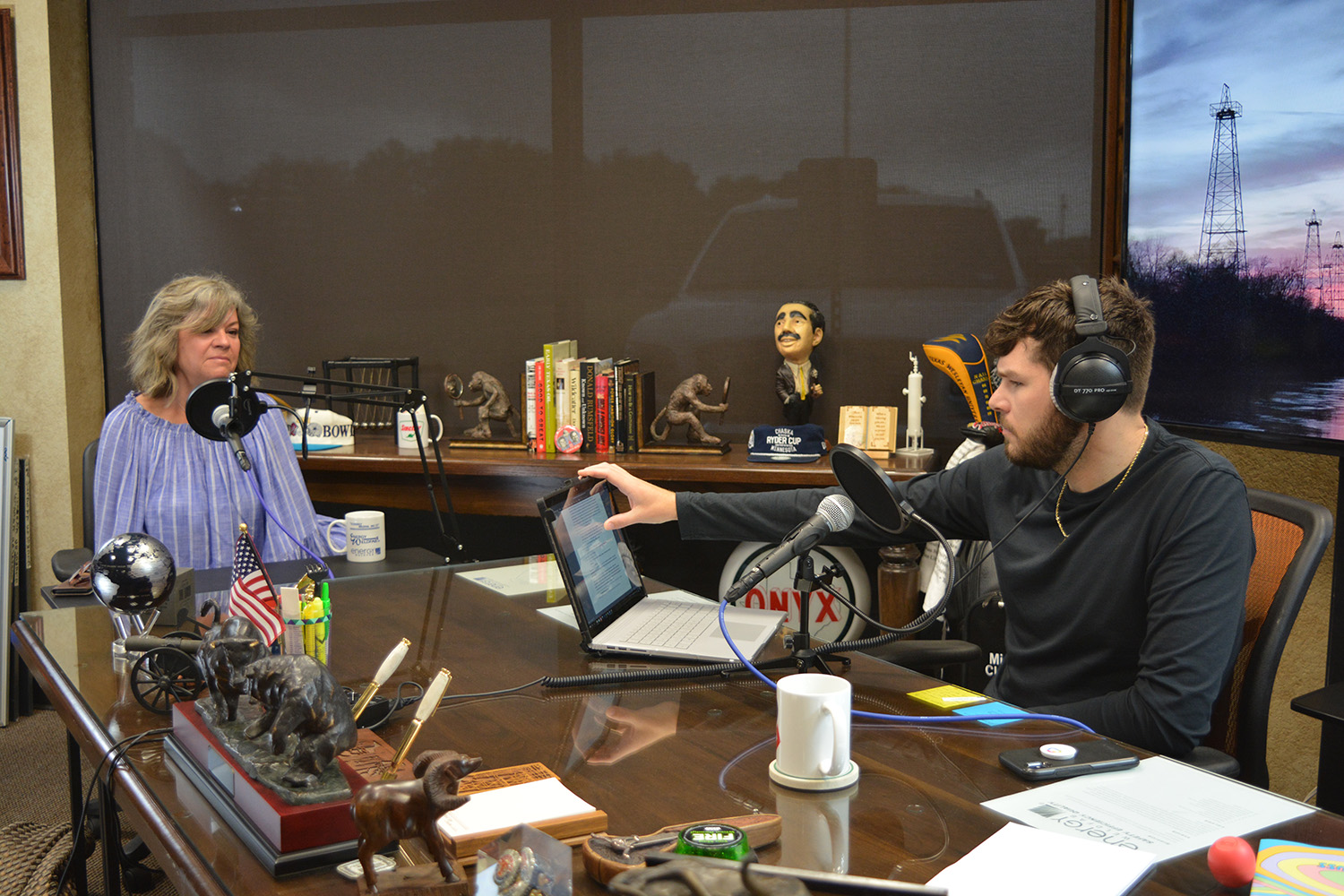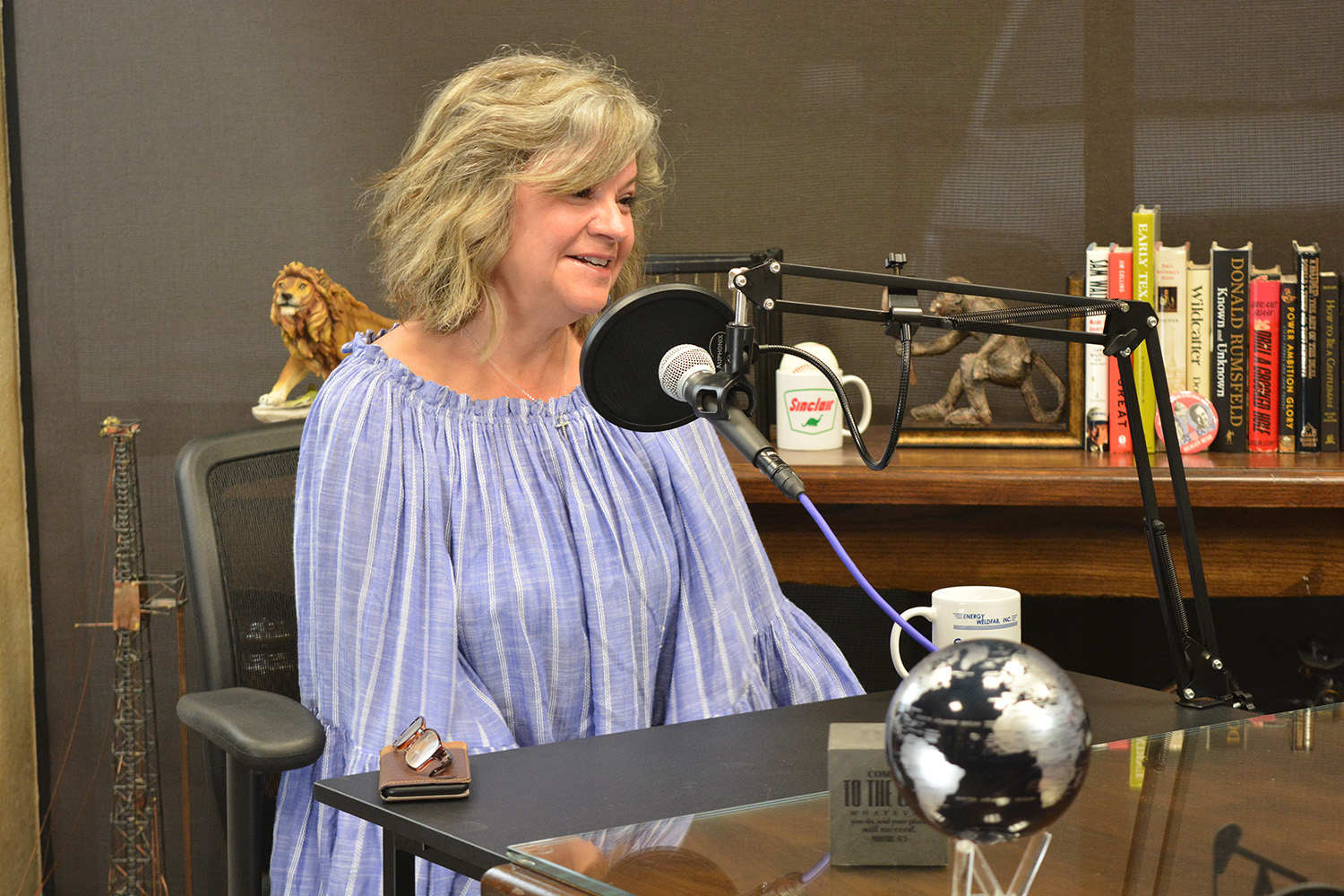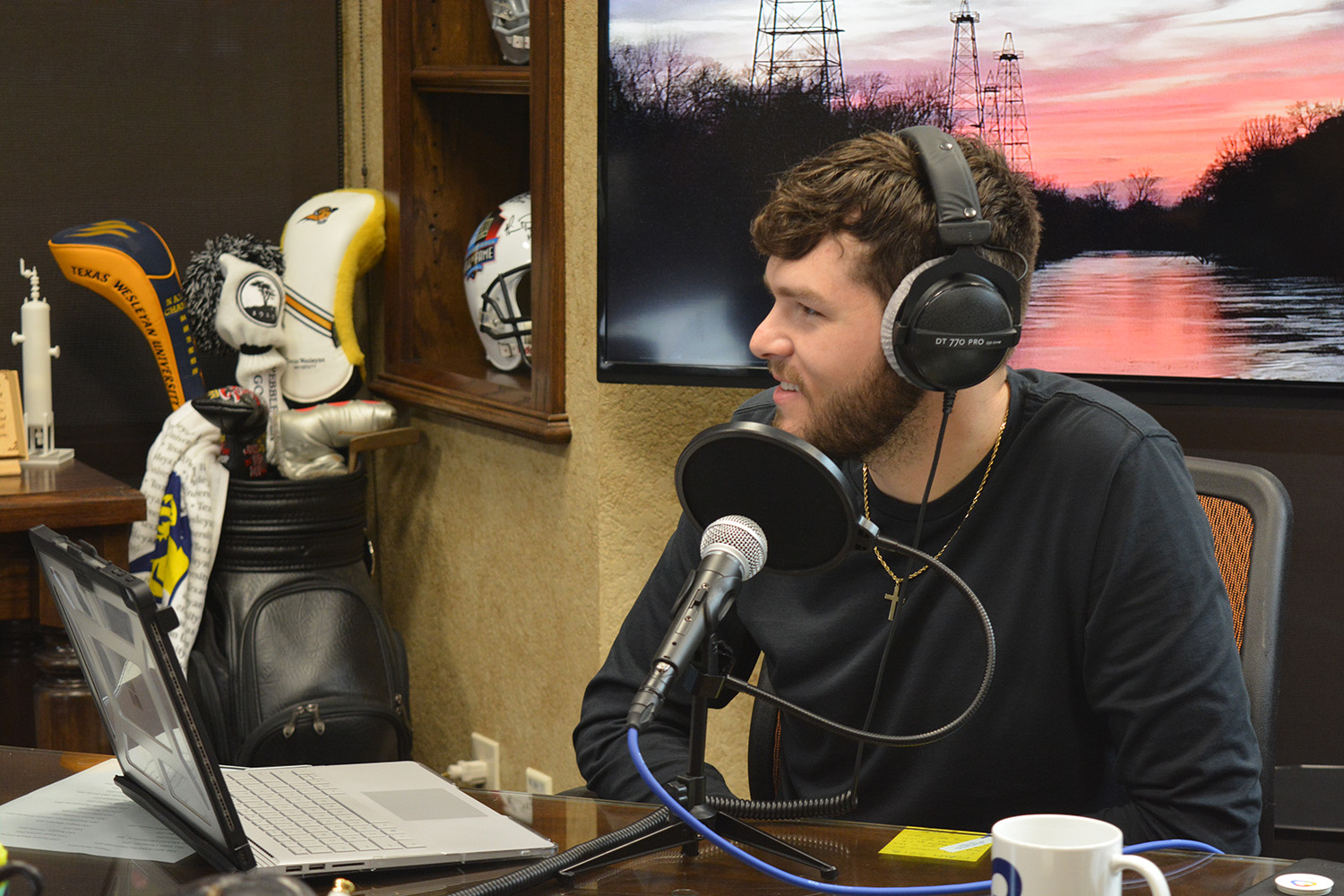Manufacturing Leadership's host Michael Clements visits with Laurie Cromwell, CFRE, president of Foundation Innovation, LLC and its principal consultant. They discuss following your instincts and the current state of education.
Show Episode Transcript
Manufacturing Leadership
Following your Instincts with Laurie Cromwell at Foundation Innovation
Intro:Welcome to manufacturing leadership, a podcast for young professionals in and out of the oil and gas industry. And now here's your host, EnergyWeldFab’s Michael Clements.
Michael C.: Hello listeners, welcome to manufacturing leadership an oil and gas podcast, I'm your host Michael Clements and I'm here today with Laurie Cromwell. She was the first woman elected to an at-large position on the local school board, the first woman school board president, the first president of the local education foundation, the first woman president of the local economic development commission and a founding board member of the local chamber of commerce.
She was the first person to receive Chamber's citizen of the year, and first to receive the outstanding service award by the Texas pioneer foundation. She started her mission in the nonprofit field in 1984, and in 2003 founded Foundation innovation a consulting firm that has gotten hundreds of education foundations and school boards to success. Today she's here to talk with us about following her instincts and what led her to where she is today, how are you doing today Laurie?
Laurie Cromwell: I'm great, thank you.
Michael C.: Well we're really excited to have you here today and thank you for traveling to come see us. Tell us a little bit about early on for you, where did you go to school, college and maybe a little bit about your first career.
Laurie Cromwell: I was born in Austin, we moved to Virginia when I was seven years old and I lived there until I was 17. And my mother and father had divorced when I was 4, my father was living in Austin so I moved back to Austin to live with him my senior year, and then went to the University of Texas
Michael C.: Well how was your time at UT?
Laurie Cromwell: I loved it and I hated it, I loved the fact that there was so much spirit and we're still big fans today. The academic part it was challenging to actually deal with all of the college pressures, but it was a great experience, I'm glad I went.
Michael C.: How much have you seen the university change over the years since your time there?
Laurie Cromwell: It just continues to grow, it is absolutely massive. In fact, when my kids were old enough to go to college, I sort of told them that I didn't think that UT was the place for them because it was so large.
They really I felt needed to go to a place where they could actually see a smaller group, two of them ended up going to Texas State actually all three of them ended up at Texas State, our oldest went to UTSA for a little while, but all did well in college.
Michael C.: Wonderful, and then after college well what did you do first?
Laurie Cromwell: Well I became a mom first and that led me to a position as a receptionist, and as I continued to be the receptionist there I was promoted to one thing after another because I was just so excited about being in my ''real job'' out of college. And continue to just work there until I became the administrative executive assistant, and managing about ten people and it was an extremely full-time position. And really taking me away from my family which at that time I had three kids and they were fairly young, so I quit to be a stay-at-home mom and that was also very challenging but fun.
And I just tend to be one of those people that's not afraid to kind of create the path for me, so when I became a stay-at-home mom all that administrative background kind of drove people crazy because I was organizing the whole block to have ten o'clock is story reading time, and ten thirty we're going to do crafts, and noon we're going to all have lunch and so they weren't used to that on our block the other stay-at-home moms, so sort of seems to be my nature to be that administrative type person.
Michael C.: So you said early on you were already in a position where you were managing others, and then you went to be stay-at-home mom after managing, did you felt like you took a little bit of that and it sounds like you took some of that with you, some of that managing to the house.
Laurie Cromwell: I did, you know when you're working in a position even if you love it, and truthfully I'm not a good manager of other people I'm much more the let's see where we can go kind of a person. And when I began managing so many people it was not the love that I wanted, and when I decided to be a stay-at-home mom I realized that being a mom is wonderful, but it wasn't as challenging intellectually as it was physically, it was exhausting physically but it was not so much intellectually and I think that's probably what led me to other things I became.
And it was funny because about I would say three months after being a stay-at-home mom I was approached by a woman who said we'd like you to be the PTA president of our elementary school, and I was honored, wow she doesn't even know me. So I became the president of the PTA and realized very quickly it was just new blood, and I had like big sucker written on my forehead because they needed people to come in and help and that was a way for me to channel all of those administrative abilities. So planning events and fundraising and helping to see the deficiencies in our school system was really very eye-opening to me, so that's one of the ways that I started trying to get involved more in what was going on with public education.
Michael C.: So we're going to be going at in the show today we're talking about the foundation innovation and some of the other topics, it sounds like whenever you got into the PTA this is what maybe you started that for you?
Laurie Cromwell: It did, it was definitely a trajectory and truthfully every step seemed to be a little bit more of an exploration, and it was intriguing to see what it would be like to just continue to follow these paths that were being created. And one of the huge kind of changes in my chapters of life I think happened, my husband had gone hunting with our three kids and it was rare that I was alone in my home, and I woke up at 4:00 in the morning and there was this extremely loud voice in my head, and it was a male voice and it said you need to run for school board and it was really loud and it scared me and I went back to bed.
And again about an hour later it happened again, and I had no idea what the school board was and ended up going to church the next morning, and when I went to church I knew there was a gentleman that was on the school board. So after the service I said can I talk to you and I did not know him at all, and I said I have had this really bizarre thing happen and you're going to think I'm crazy, but 4 o'clock this morning I heard this large voice screaming at me to run for school board and he sat down on the Pew and started crying. And I was kind of freaked out, and he said we've been praying for somebody to come forward to run for school board, and I really started to freak out.
And I said well I'm going to tell you this, my husband and I decided that I would become a stay-at-home mom and I gave up a pretty nice paycheck, and I have been volunteering in the school systems and there's no paycheck, he will never go for this. And so date night is our Sunday night, and when the kids were little and we went out and I said at dinner I said I want to ask you something, I said the school district is run by a school board of elected officials and I've never been an elected official, but what would you think about me running for school board? And he looked me straight in the face and he said you would be awesome. So I said to myself at that moment God this is not funny, I don't really want to do this, and long story short I had to run against the score president that had been there for 12 years, and I have my circle of friends from the PTA and I asked them I'm going to put out an email and if I could get 500 people to say that they would vote for me they think I'll win and within 30 minutes I had 500 people.
The president resigned for no reason, we have no idea why and someone did run in that position against me, and I did win the position. And from that point forward I really felt in my life that if you listen, even if it is a very loud, strange, scary voice but if you really do listen there are opportunities and there's pathways that I think we get so busy in our life we miss, and so I'm not always great at it but I try many times just to take a step back and see where am I headed is this my path or is this somebody else's path, and if I feel like I'm trying to be too much in control to let that go and see where I might need to listen more.
Michael C.: So staying obedient in the Lord, it sounds like that's exactly where this came from, I take it that that loud voice you listen to your faith, you're obedient in what was being told to you, was this a start of a domino effect whenever you got on the school board?
Laurie Cromwell: You know it was, and my pastor suggested that I go on a walk to Emmaus, and a walk to Emmaus as a faith retreat for three days and it really changed my life. And that obedience that you're talking about, it became something so core centered in my life that it took away some of the fears that you have many times when you're trying to go out there and do something, that may not be something that is in your comfort zone. And when I learned that even scary things if I had that core center of faith they weren't near as scary, and even failures seem to be great learning experiences.
And the older I get I look at people it's funny when I was four years old, my grandmother asked me what do you want to be when you grow up, and without even hesitation and I remember this like it was yesterday, I said I want to be a senior citizen and she said what, and I look back on that and what I really was saying I think was I want to get to the point where I'm a senior citizen and I look back on my life and I say wow you did amazing things, you rocked it.
And the older I get I'm looking back on my life and I'm thinking I got a lot to do still, I mean I don't know if I've felt like I really rocked it, I feel like I've done a lot of things that I'm proud of, but there's so much to do, so much more to do.
Michael C.: Well I would say you're rocking it Laurie. Where did you have to make sacrifices as you were staying obedient through this process?
Laurie Cromwell: That's a really good question, I would say that many times in your life you develop relationships that may not fit you, and may actually detract you from either your faith or paths that you want to go on. And I think it's sometimes difficult and you have to make sacrifices in relationships sometimes and maybe either sever ties or create relationships or mend relationships if you need to with people that you feel are important in your life.
And I think truthfully for me personally relationships are the hardest thing in the world to I'm a go-getter, let's go let's go let's go kind of a personality and not everybody wants to be that exhaustive, and not everybody is on that same path of creating opportunity. Some are very comfortable in the way that they live every day, and don't need to go out there and keep seeking. And so I think relationships I think are probably one of the things, I wouldn't say sacrifice, but one of the things that I may have not always paid attention to when I'm focused on something.
Michael C.: So how much would you contribute having some would call it too much energy, I put myself in the same boat sometimes you just feel like it just doesn't turn off. But how much would you contribute to having a lot of energy and vision to contributing to what you do?
Laurie Cromwell: Honestly I consult with and we have nine consultants in our firm, and when we started I really started the education foundation and he's consolidated. After being on the school board, or elected to the school board our superintendent said we really need to engage the community, and there are education foundations that support public school systems and I think we need to look in to it and explore it, and with your nonprofit background I really want your help to get this off the ground. And we did it, and within six months we had raised thousands and thousands of dollars, we had 30 people on our board that were ambassadors for the school system and we were doing a lot of great work for the schools.
And people started calling and saying can you come help us we need a foundation, and so what happened was I loved doing that and I was doing it and one day I said to my husband I'm just going to print some business cards and see what happens, because I can't keep doing this and traveling around and helping people just for the great good of the will. So I got some business cards printed and started the business in 2003 and today we have nine consultants and four staff people, and we've helped probably 300 or more education foundations in one way or another, we've worked in eight or nine states and it continues to grow.
And I think those early days of just understanding the deficiencies in public schools, really helped me to this passion in my world of trying to make sure that the public understands what they can do to engage themselves. Because so many kids and educators don't have the tools that they actually need, and most people in your community, this community majority don't have kids in the system. And so they don't really understand, they don't have a desire need to perhaps go into a school and say what do you need to be better or more high-performing.
So I think that it's become a passion of mine overall, and I think it was those early days of really just taking the leap to become a stay at home mom, taking a leap to be the PTA president, taking the leap to run for school board and it just seems to one connects to another, and I don't know where it's going to keep going. I have ideas, I mean I don't know how long I will want to continue this travel that because I travel so much, but advocacy is one thing I see on my horizon of trying to create this perhaps even additional understanding with our legislature about how they can be a resource and a help to our public school systems.
Michael C.: Right now what is your opinion of our legislature, especially in our home state of Texas?
Laurie Cromwell: I know quite a few of them and I really do believe that they're there for the right reasons, and they really are trying to make Texas even better. And the challenge that they have is every aspect needs resources, but having said that I do believe that there is a disconnect of their understanding of public education, of the demands that are put on our public school systems that are unfunded mandates in all sorts of ways that they make it a little bit more difficult.
And the answer of charter schools and allowing this choice and diverting public funds to charter schools is really going to be damaging even further, our public school system for our kids.
Michael C.: Do you see our legislators making a positive impact going forward in our school systems, I know that over the last few years I guess it was not too long ago West Virginia the teachers went on strike, and there's talks of other states this occurring, is Texas on top of it?
Laurie Cromwell: We do not have a collaboratively organized group; we don't have unions for teachers that type of thing. I don't see that happening here in Texas although we are not by any stretch at the top of the list of the salary structure, but Arizona, Oklahoma, West Virginia all had similar situations. And I think that we are going to have to probably see that it becomes more broken before people realize that we need to fix it, and we need to modernize it to today's approaches of learning.
And our educators do a phenomenal job, a phenomenal job and receive very little credit for the most part. So I think some of these movements if you will to try and create public awareness I think are going to continue may not be the same way that West Virginia did it, but I do think that there's going to be more.
Michael C.: Well maybe you can help me understand this a little bit, one of the things that in the primaries that was on the election ballot, it talked about I guess the voucher system where a student could go to a private or public school can, could you explain a little bit about what that means?
Laurie Cromwell: Well everybody has a right to go to receive an education, and everybody pays for that, so your taxes pay for public education. And the amount of money that it takes to even educate one student is around eight thousand dollars in Texas, and we do not have enough money, eight thousand dollars does not meet the needs of the expectations of our graduates. And because of that when you take any money away from that already unfunded system and put it towards any other system, you are going to create even more hardship with the system that we've created, that everybody has a right to.
The other thing that people don't really understand is that charter schools and private schools can pick and choose who their students are, the public schools cannot. There are some school districts that have students that there are 137 or 138 different languages that they have to teach in that language to that student, and that's very expensive. So every single student has a right to public education, and the public schools can't say you're a difficult student, you have challenges, and you have special needs we're not going to take you.
The charter schools and private schools have that option, so they take sometimes the best of the students. And so if you're diverting some of the money that needs to go to the public school systems to help meet some of these needs of these students that are very challenging, and putting it into charter schools for the students that may not need so much attention, it is a system that is not going to work in the end, I definitely do not think the voucher system is the answer to educating our kids.
Michael C.: Well thank you for that definitely helped with understanding that a little bit better, hopefully some of our listeners too that was a very simple way to understand that. So shifting back over to your to the foundation innovation, just going into that a little bit, can you explain a little bit of the impact that an education foundation that's formed in a community, what kind of impact can that have on a school system?
Laurie Cromwell: Huge, and it's really ironic to think that a charity that supports a public school system can be impactful, because at the end of the day the bottom line is you're creating a charity that's supporting a governmental entity, a taxing authority and why would people want to give to an education foundation when this big governmental entity over here is not a very where they cause perhaps. So you have to make it come alive to the people in the community, you have to help them to understand that the foundation is really a bridge between the community and the school, the public school system.
Most communities have such a reliance on their public school systems, meaning that my property values rely on a thriving school district, my property taxes are set in part and many times the biggest part by the school board and our workforce comes out of our public school system, so those three things impact every single person in the community. And knowing that every single person ought to have a stake in it, they ought to be involved in making sure that there's a thriving school system.
So with that in mind if you can go out there and message some of the deficiencies to the community, and engage them to understanding that our kids and educators need them, it is a beautiful thing, it is absolutely amazing. I love doing this work because it's like reading a new book; every single Education Foundation is completely different than the next, because every community is unique. So it's like you start a foundation or you reorganize a foundation or you enhance a foundation to be more impactful, and you never know where it's going to lead.
There are so many stories, one of my favorite stories was there was a student who was a high school student at risk of graduating, and he went to the campus for disciplinary, every school district has a campus when students do not follow the rules you go to this Disciplinary campus, and you can refer to it like if you have small kids it's a timeout. So they go there for our period of time, realize that this is not the way you behave and then you go back to the high school and hopefully you have learned and you don't get in trouble.
Well this particular student he kept getting in trouble, and he would just go in this revolving door, going to the Disciplinary campus, going back to the high school, getting in a fight going back to the Disciplinary campus, going back to the high school, skipping school, going back to the discipline it was just a problem, he was at risk of not even graduating. The Disciplinary campus actually applied for a grant from the Education Foundation, and it was to build a greenhouse and grow tomatoes and the students had to follow science and math and different initiatives with that particular grant.
And this student was put in charge of the grant, he was responsible for implementing the greenhouse and growing the tomatoes, and he was also put in charge of leading three other students to help him do it. And he came and spoke to the foundation that year at their banquet and stood up in front of 200 people and said you saved my life, he told 200 people that were supporting the Education Foundation that twenty five hundred dollars for that grant to build a greenhouse and grow tomatoes saved his life.
Because he had never ever been responsible for anything, he had never been put in charge of anything and he had never had to lead other people, he had never had other people rely on him and he stood up there and he graduated and he told them he plans to be a very successful person in this world and it was because of that particular grant.
Michael C.: So you had an at-risk, he was at risk of not even graduating to this Education Foundation came and was able to raise funds, produce a grant to build a greenhouse, this gentleman led that I take it he graduated?
Laurie Cromwell: He did. And the funny thing the foundation was not there to save this kid, but the indirect benefit of that was massive. And there are stories like that every day and when I work with foundations that's my goal is say, find that kid, find that teacher that we have really impacted because the money is great, but the impact of having a community person realize that that educator is so sparked for learning because of a grant that she got or he got or a student then it really comes alive and you start to see additional funds.
There are foundations that are raising five thousand dollars a year, there are foundations that are raising five million dollars a year and the money's great but the impact and the engagement of the community is really where I think the true benefit of a foundation is.
Michael C.: It's so neat to hear you talking about this because the high school that I went to Sabine high school, it was a small school, I think they went down to 2A after I graduated, they may be back to 3A now, but within the last two years they started an Education Foundation out there. And whenever I was in high school was when they started the Booster Club and people thought that was just a really odd thing that you would need a booster club, the other schools around us all had it and they had really nice I guess athletic departments, we didn't have a Booster Club that they finally got one my senior year or while I was in high school.
And that was neat, they would cook us hotdogs, do nice things, things that students before us maybe didn't get the benefit of. But this past year we went to a dinner it was at a gentleman's farm, there was a band there, they did a live auction and this was something in the Sabine community that had never been done before, never seen this before. And I want to say the event raised over $50,000 and that was $50,000 that had never been raised in Sabine before, and just recently they went and handed out all the grant checks.
And I thought it was just such a neat experience because I was thinking wow it is about time, this is a wonderful community out here, you have wonderful people, you have a lot of go-getters, but what's crazy think is that we're just now figuring this out. But it sounds like Laurie you're going to different school systems, and you're finding the other Laurie's in those school systems that are excited and see the possibility of what it can do. How amazing is it for you to see your obedience in the Lord being able to produce results similar to what I've seen in Sabine?
Laurie Cromwell: You know I think that we all really have in the core of us this desire to do good, and when you can collaborate people that have that goodwill and put them together for a common purpose and cause, like the event you talked about everybody knew why you were there. You're having a great time, you got to socialize with everybody which is probably something that was very needed in the community, but the foundation realized you know what bring them together, let them learn from each other, let them learn about what we're trying to do and let's see if we can raise some money and they did.
And without the foundation that collaboration, that need would not have been met. So I think that bringing it all together and you're right when I go into school systems, I find so many people in the community that really do want to help they don't know how, they just don't know how. You just don't walk into a campus and say I'm here; I'm here to help and be impactful. And so when you bring a foundation into the scope it's not typically run by the school board, it's not run by the school system it is really community led. And with that in mind it allows additional credibility for the community to engage in the school system, because they know that the foundation is there just to support it.
So I think that collaborative effort, and I really do think that I'm doing God's work and I engage with people that I still am friends with today that I started foundations with 10 years ago, 12 years ago. And some people really need a purpose and when they're volunteering in these types of organizations and seeing the impact that it makes, they become so much more engaged and charged and I think God's working in them too, so it's just a really rewarding experience.
Michael C.: When you started doing this early on and you would go in and you would meet with these school systems, how hard early on was it to control your energy because I'm sure you could already see a vision, you could already see oh yes we got this, we're going to have this going on, we're we'll have this going on, how hard was it to maybe control that energy and be able to put that into words where the school system or the leaders in that community would be able to understand what you potentially could bring to the table?
Laurie Cromwell: That's a really good question, and I think I've just learned by experience that I can't go in and tell them what to do, I can go in and facilitate what's happening. Because they're synergy really is different with every group, so the boards that are serving on the Education Foundation board of directors are different in every circumstance, I'm working with a group right now in California, I'm working with a group in Virginia, just even states have different personalities and complexities and there's no way I could go in and tell them exactly what to do.
I can tell them best practices, I can tell them experiences of other foundations, I can motivate them to death which I love to do, and I can help them steer away from what we call potholes the things that are going to mess you up. So when you're creating a business which essentially these education foundations are businesses, they're just charitable businesses, the structure we can put in place very easily but I've learned if I push them because of my energy and my understanding of how things happen, and I see opportunities for them that I want them to take advantage of, if I push them to do it then it really is not as impactful and when I'm finished working with them they're not going to be as successful. I feel like my job really is to guide them and empower them to be the best that they can be, and set that structure up so that they can be sustainable after I'm gone or after any of those board members are gone.
Some of the weird things that happen along the way impact school boards and administrators, I've seen education foundations become very successful and the school board get kind of like wait a minute, we need to make sure we understand what's going on, so it's a collaborative effort you've got to make sure those elected officials are really engaged in understanding what the foundation does because it can get a little bit out of sync.
So I think that the energy that I bring really is kind of eyes wide open all around to make sure that if I see or hear of anything, that is an indicator to me that there's an issue or a situation that I don't ignore it and I bring it to the attention of the foundation, because we need to make sure that this is all good, that this is all good stuff. And we don't want to get involved in the politics, we don't want to get involved in any problems, but there's a lot of great things that happen when that collaboration happens and everybody really takes on a lot of energy themselves not just me.
Michael C.: I guess sometimes thinking about it I guess you could see an Education Foundation, the leaders of that organization some point gaining a lot of power over the school system with even above possibly school board members, is that kind of...
Laurie Cromwell: Well they each have a role, so the school board actually is the governing body of the school district, and the foundation is there to enhance and support what that plan is by the district administration. In Texas we've had 55% of our education foundations have had somebody run for school board, which I love that because when you become involved in an Education Foundation the superintendent typically serves on that board, so they're reporting to the board things that are happening in the school district. And when that happens and you learn the great celebrations and some of the challenges that are happening, you become empowered to want to be part of that system.
So many times you see people stepping up and running for school board, which the reason I think that's absolutely amazing is that you don't have somebody running for school board that has an agenda, you don't have somebody running for school board that has no idea what the challenges are with the school district, so they come in very well-versed in understanding of how that can be part of the solution.
Michael C.: Have you had the opportunity to mentor anybody through this process?
Laurie Cromwell: You know a lot of my clients and even my staff calls me the therapist, because it just happens by nature particularly with superintendents, they have a really hard job. They don't get a lot of praise, they have a lot of responsibility, they get beat up in the community perhaps and I find myself on the phone sort of working through some issues with superintendents a lot. And they're not always related to the foundation, but they know that I work with a lot of superintendents and I actually had a conversation with a superintendent that was, and this was a while back, but I knew that it really wasn't the right job for him and I think in some way he knew too.
But there were some issues going on between the school board and the superintendent, and we had a real heart-to-heart conversation and I said you know life is short, and we all talked about this quality of life thing and I said I wonder if you've thought about that and he resigned like the next week and he's following his own path of what his quality means to him.
And I was really proud of him for doing that, because it was a very high-paying, very high-profile position and he followed what he felt he needed to do. And I don't think I really made him make that decision, but I think just being able to talk it out with me was an outside voice that was really helpful to him.
Michael C.: How much better do you feel that you've gotten at your job and what you do and what you can bring to the table for a community or also as a soundboard for say a superintendent, how much do you contribute to that to experience along the way?
Laurie Cromwell: I would say all of it, when my first client they were restructuring their foundation, they had had three superintendents in three years, they had a riot at the high school, they had four failed bond referendums, the community was just not there for them. And they wanted the foundation to be that vehicle of support and I was really nervous, because that was a lot of challenge and I had never really done this where I was getting paid and so I was I was concerned. And I think that probably is where my energy, I probably thought about that client 24/7, I felt so much responsibility and within a year we had turned it around.
They had raised about $200,000, they had a new superintendent that was engaged with the foundation, and she was amazing. She was out in the public, and then I realized right then when I told her you have got to be the face of this district, you cannot just run a school and trying to educate kids, you've got to engage this community and use these Foundation board members as your ambassadors. Give them the message that you want them to go out into the community and talk to you because they're talking to their friends, they're talking to their family, and they’re going to church and talking to people in church, give them the message.
And within a year there was a lot of support, there was money, the teachers were happier, because the motivation of those grants internally in the classrooms was a huge motivating factor. So that I think was the first time I was like I think God's put me in the right spot, I think all of these things have led up to this, and that was in 2003 and I still love the work that I do, but I find I give a lot of the new clients to the other consultants and give me the ones that are the really difficult, real huge challenge areas.
And we work with school boards in general just to try and create a collaborative team, which can be even more challenging and not near as fun. But I think that my gift right now are those really challenging clients and opportunities with creating either a healing process, or some kind of opportunity for the community and the school system to get back together using the foundation.
Michael C.: How important has it been to have a team to work with since you got started, and you just got business cards made for yourself. How important has it been to build and develop a team?
Laurie Cromwell: Well two things I want to say about that, one of them is kind of my mantra right now, charities in general the public does not want to give to charities that are spending a lot of money on operations, they want the money to go to programs and I think that should be the standard. But if a charity sees that there are opportunities to create strategies that are going to create some operational costs, but the return on that investment is going to be really great later on, a lot of times charities are not given that opportunity. Like a for-profit company like myself, if I were in that same philosophical belief that I couldn't spend money on operations, I would still be the only consultant in our firm.
So I had to spend money on operations to build a staff, to create additional capacity for our organization to bring on additional consultants, so we could handle the workload, so we could grow, so we could be a team and be more impactful not only financially but for the work that we really believe in. So one of the things that I do when I'm working with clients is to say I want you as community that people to understand that Google and Facebook in these organizations that are spending an inordinate amount of money on operations for the return on their investment, that we need to run our foundations like a business.
So we have that same model in our office, most of our consultants are virtual so they're all over they're not in a building, because we have the technology that's capable today. You call our office and people don't know that it's actually being sent to somebody in Kansas City to pick up the phone, or Oregon or wherever and I think that's a really great thing. I have the philosophy, I'm not a great manager of people, I'm a great motivator of the mission of what we're doing, we have an office manager that handles all of the day-to-day management, our consultants are very low maintenance in fact when we hire people we tell them flat out this is a no-drama zone, and we're interviewing actually somebody on Monday.
But our team knows that we can rely on each other, and that we have a lot of great work that we're doing and so we try and celebrate those successes and in contact with all of the consultants on a regular basis.
Michael C.: As far as organizational behavior and organizational development goes, how important was it for you to learn what you were good at and what you may not have been as good at or thought you were good at, but maybe you knew there could be someone else they could do it a little bit better?
Laurie Cromwell: Well I always want to have people around me that know more than me, I really do. And the person that we're looking to hire on Monday is going to be social media, website I never want to learn how to be a web designer, I never want to figure out how to be out reaching into the Facebook market, I want to hire somebody that knows how to do that. And so I want people around me that know more than me, I want to learn from people, I want to learn approaches that may be different than my own and how I can be better.
So we all have opportunities where we can talk about that stuff, and all right my staff bring stuff to me all the time you know what do you think about this, I'm like go with it, figure absolutely if you think that we can do it I'm a total risk-taker, total risk-taker. And so that I think is important in business, and I think that you can get stuck. My husband and I started a business in 2000, a construction business and he was working for another general contractor, and I said you can do this on your own and he resisted for a little while, he's not near the risk taker that I am and he really resisted until I said we've got this, we have got this.
And so we started that business of 2,000 and we really wanted to have more flexibility with our children, and it really has proved to be a very good move on our part, also I think it was very God driven, I still think it's very God driven and so we're able to actually have both companies in Buda and one housed in one location. And so we're able to be collaborative in some of the employee responsibilities, which has been great.
Michael C.: I mean as you're taking those risk and not being shy about taking risks, how much do you credit that towards your faith and knowing what the outcome is already, how much does that contribute and also for listeners out there that may not be relying on faith right now, what would you have for them to say hey you do need to rely on your faith in those moments of risk?
Laurie Cromwell: I look back at going to college, having our son very young, getting a job that went through many different opportunities of responsibilities, and launching every step and I think it was so deliberate. And I look back and see how one just built on another, even if it felt like the path was completely backwards or a complete U-turn. So I would say that early on I probably didn't know faith very well, I didn't really understand it I believed in God, but I didn't really understand that when there was a challenge or I was afraid or concerned that I could really let that go when I start to develop my faith.
And the walk to me is that I mentioned earlier really was an opportunity for me to know God, and really believe God and to believe that if I can be still and be quiet I can probably hear what I'm being told to do. If I don't resist it, and I allow him to have a conversation with me, and follow that it has proven to me time and again that that is the way to go.
And not even expecting a result has proven to be really great return, really helpful to me and my husband's been on the walk to me is too and we sponsored our son, our oldest son and my father two or three years ago and they became on fire too for this. And it has been amazing to watch them, and to see their faith grow, and they were very faithful before, but the spirit that they now have it makes my spirit even stronger watching other people around me that really do have that deep faith.
Michael C.: It's so encouraging to hear you say that about getting into a quiet place, and being able to hear especially after you initially heard the voice while you were sleeping and it was so loud, but to hear you say that I would say most of us that's how the Lord talks to us. It's in that moment of quiet; it's in that moment of reflection and also that moment of maybe trying to seek clarity and vision for what the Lord has for our purpose.
And Laurie I'm happy that you followed that path and stayed obedient on that path and continued to seek out the Lord in your decision making, it sounds like through your organization, through your team and through the communities that the Lord is really able to work through you and impact in a positive way. So it's very exciting to hear how by staying obedient you can contribute and give back to your community, I think a lot of people say well what's the Lord going to do with me, and it sounds like you just have to let the Lord do.
Laurie Cromwell: That's right, and my husband says all the time he's like I listen, I don't hear a big loud man's voice, I want to, I want to hear that and I even talked to my pastor about that. I was like I don't know if I should tell that story, it sounds kind of spooky, I'm not so sure it would entice somebody to be more faithful, but it is what it is and I really what happened and I feel very blessed by that.
Because maybe I needed a big loud voice maybe I was not paying attention and we laugh all the time, sometimes it takes a big stick to get somebody to pay attention to not trying to create and control their own destiny and I think I just needed a really loud voice.
Michael C.: Well I think a lot of communities and a lot of people are happy for you listening to that loud voice, and pursuing what at the time just seemed like you were just going to join a school board.
Laurie Cromwell: That's right.
Michael C.: For young leaders out there how important is it to not focus on maybe where your wanting to be in your endgame, but focusing just on whatever the next task is at hand. What kind of encouragement do you have for younger leaders out there?
Laurie Cromwell: I would say find something that you're passionate about and do it really well, and if you're in a job and my kids struggle financially at times, and I do think that that's a concern for young leaders. But we have all been there, and even the maybe not so glamorous job or not such a high-paying position leads you to understanding a lot of either skills or relationships or work ethic that will continue to grow and if you focus on what you're really passionate about, and you keep moving in different directions to bring you those experiences, you'll see results and once you start to see results I think it sort of lends itself on top of each other.
I think we can get paralyzed sometimes with just life, and all that it brings to us and if you're financially struggling or you're in a bad relationship or you don't like your boss or you have whatever happening, we all have struggles and I think that getting paralyzed by those struggles can create a domino effect in the wrong direction. So I would encourage young leaders to figure out what they're passionate about and follow that, even if it's just a small thing and continue to look for the opportunities that you can expand on those passions and learn from other people around you.
Michael C.: That's terrific advice Laurie, thank you for that. So what's in your future?
Laurie Cromwell: I don't know, I've thought about that and one of my goals right now, they always say if you have a goal and you say it out loud you have to do it. I would like to go to Costa Rica or a Spanish-speaking country for a month or so to learn Spanish, that's kind of my next thing and it's starting to weigh on me where it's going to happen. I've been talking about it for about a year and I'm actually going to figure out, I told my husband this is what we're doing you come with me or not, but I really do think that it is something that my heart is being pulled to do and I cannot tell you why.
But I've always wanted to learn how to speak Spanish and I think that's probably secondary to this being a goal of mine, I really do think that in my world and in my day to day I'm very blessed, and I can sometimes lose sight of those that may not be as blessed to have the luxuries that we have in the United States. And I would like to go and maybe see how people are just as happy and just as faithful with less around them materially, and I think that's really why I'm being pulled to do this, but we'll see I'm sure there's other reasons too that I'll find out.
Michael C.: Well there's no doubt in my mind that if you want to learn Spanish, I bet you can and you're going to be good at it. Well Miss Laurie for any of our listeners and communities out there, how can they go about, like what should the first steps be if they're wanting to form an organization or a foundation in their community, what is the first steps they should take?
Laurie Cromwell: I would sit down with a superintendent, and I would let them know that you're passionate about supporting the school system whether you're a parent or not, and that you're interested in trying to get this off the ground. And if the superintendent is supportive of that get a small group together to start talking about ideas, start talking about ways that the community can be supportive whether it be through a granting program like we mentioned, or whether it be through engaging in other ways. Larger districts typically have some areas that they would like funded, that they can help with like Austin for example has social and emotional learning curriculum that the foundation has helped support financially.
So I would say that's your first step is getting a small group together, making sure their superintendent is involved and engaged. An engaged superintendent is really critical particularly early on, and then you never know where it's going to head from there and get your charity going, and get additional people and let it go.
Michael C.: Well and if you're out there listening and you would like to get in touch with Laurie and her foundation innovation, you can contact Laurie via her website FoundationInnovation.com or on social media at Facebook.com/foundationinnovation.
Also you can email Laurie if you have any questions or would like to get more information on their organization, Laurie@FoundationInnovation.com and then once again the website on that is FoundationInnovation.com. And I guess there are plenty of information and steps and things that they can look at on your website to learn more?
Laurie Cromwell: Absolutely, we can get as much information as they need.
Michael C.: Wonderful. Well Laurie it's a pleasure having you here today, I look forward to hearing more about your future and hopefully one of these days maybe we can even do a podcast in Spanish who knows. Well Laurie thank you for being here today, and traveling up here to East Texas to be with us.
Laurie Cromwell: Thank you for having me, I really do appreciate it, it's been a really great experience.
Michael C.: Wonderful. Well for our listeners out there you can send us your questions, if you'd like for us to ask any of our leaders or guests certain questions or if you have a question for them you can email us Podcast@EnergyWeldFab.com. As well as you can find us on Facebook, Twitter, LinkedIn and Instagram at @EnergyWeldFab and also just check us out on the website EnergyWeldFab.com/podcast and you can find our podcast on there.
We also are on Stitcher, Google Play, iTunes or it's the podcast app on the iPhone, so if you want to listen to us you can check us out there and your feedback is important for us and how we improve our show, so reviews help us as well as just get your friends and family to listen to and I appreciate all of our listeners out there, and the feedback that we are getting.
So I want to thank everybody for another wonderful show, thank our producer Gabby Sims and we look forward to bringing you another great show here in the future, thank you.
[End of Recorded Material]

